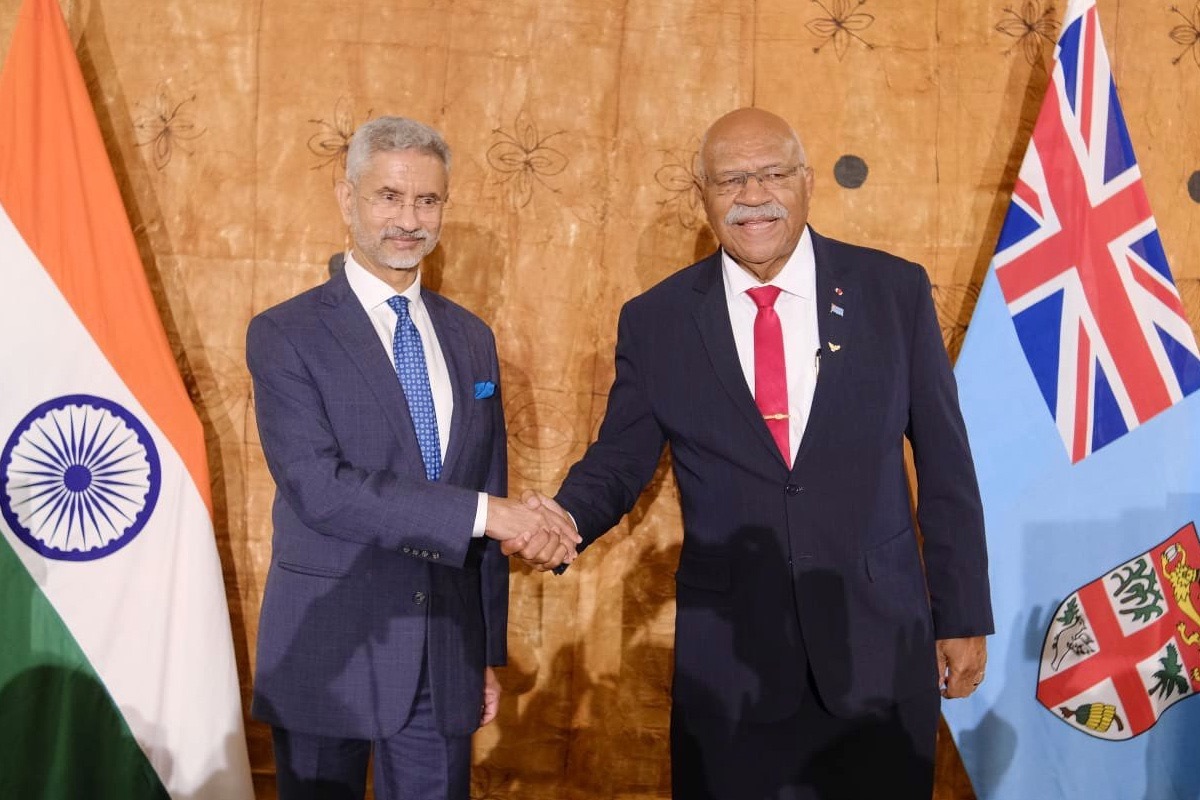

Fijian PM Sitiveni Rabuka on Feb 16 refused to compare Fiji’s relationship with India and China, but hailed New Delhi as a “special friend” and “trusted partner”.

Diplomats in Fiji are working overtime as they look to balance the influence of two Asian arch-rivals – India and China on the South Pacific heavyweight where people of Indian origin dominate almost every aspect of life.
In the recent past, Fiji has received great global attention and engaged with big world players like the United States and its allies who seek to curtail a belligerent China’s expanding reach in the Pacific Ocean.
Strategically located in the middle of the South Pacific, Fiji – which is home to about 5 lakh Hindi speakers – has the second largest population at 900,000, the second biggest economy at US$9.1 billion and the third largest land size in the region. It hosts many international and regional organisations.
Even as the US seeks greater cooperation with Fiji, India has also upped the ante by taking the mega World Hindi Conference to the archipelago nation’s capital Suva with great pomp and fervour.
External affairs minister Dr S Jaishankar led a host of Indian diplomats, academicians, and political leaders for the conference, which is organised in different countries for the promotion of the Hindi language once in three years.
On the sidelines, India and Fiji also held bilateral talks and signed an agreement on visa exemption for diplomatic and official passport holders for a period of 90 days. EAM Dr Jaishankar also addressed the Fijian parliament, which witnessed speeches in Hindi by Fijian lawmakers.

Addressing a joint press conference, Fijian Prime Minister Sitiveni Rabuka refused to compare Fiji’s relationship with India and China, but hailed New Delhi as a “special friend” and “trusted partner”.
When reporters fired questions on whether China was a subject of discussion during the talks, the Fijian PM, taking a super cautious approach, said: “We thought it was a bad manner to talk about somebody who is not present here. We spoke about our own cooperation. We are very fortunate to have such a great power and economy talking to us.”
“We have great old friends. There are no really new friends in this region. We have been friends with India. We have been friends with China and we will continue our relationship,” he said, adding, “India will always remain a special friend and a trusted partner”.
According to reports, Fiji recently terminated a 12-year-old agreement with Beijing for training its police personnel.
Fijian PM Rabuka went on heap praises on India for standing by the tiny nation in “times of great need”. “We are grateful to the government of India for supporting us through the provision of life-saving vaccines and humanitarian assistance (during the Covid-19 pandemic),” he told EAM Dr Jaishankar.
He said that India and Fiji’s “robust multifaceted partnership” covers cooperation in all major areas of nation-building.
The Fijian PM hailed the visa waiver agreement as a “landmark achievement”. “It will certainly be helpful in encouraging greater travel between our two countries,” responded external affairs minister Dr Jaishankar.
India and Fiji have stepped up their engagements in recent years. EAM Dr Jaishankar’s maiden visit to the Pacific nation comes close on the heels of a visit to New Delhi by Fijian Deputy Prime Minister Biman Prasad.
In a statement, the ministry of external affairs (MEA) said, “India and Fiji share close, friendly and long-standing relations with a strong element of development partnership. This year marks the 75 years of the establishment of India’s diplomatic presence in Fiji.”
In Fiji, politicians and policymakers view China’s presence through the lens of state development and assistance. But concerns are mounting in Suva.
“With China, these concerns range from debt recovery to the possibility of ‘Chinese institutionalism’ — where the sponsorship of large projects cultivates foreign influence over domestic institutions, detracting from current practices and organisational self-sufficiency,” believes Shivani, a lecturer at the University of Fiji.